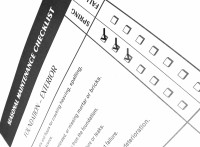- Selling
- Buying
- Landlords
- B&R Landlord hub
- Management services
- Vacant management
- Landlord reviews
- Rental investment
- Furnishing and refurbishment
- Yield calculator
- Free online valuation
- Stamp duty calculator
- ROI calculator
- Landlord resources
- EPC guide
- Video hub
- Area guides
- Fees for landlord
- Lettings Laws
- Why choose Benham and Reeves
- Renting
- New homes
- House prices
- International services
International offices
China, Hong Kong SAR, India, Indonesia, Malaysia, Middle East, Pakistan, Qatar, Singapore, South Africa, Thailand and Turkey
Learn more - Contact
- News
- Contact
- About us
- My B&R
10 mistakes a landlord can make
- Advice clinic
- 06.06.18
- Marc von Grundherr
|
Getting your Trinity Audio player ready...
|
Contents
- 1. Forgetting to lodge your tenant’s deposit (TDS)
- 2. Missing a gas safety check
- 3. Broken smoke and carbon monoxide alarms
- 4. Low energy efficiency
- 5. Adequate ventilation
- 6. Furnishings
- 7. Forgetting to make an inventory
- 8. Not buying landlord’s insurance
- 9. Business before pleasure
- 10. Getting the math wrong
London’s rental market is as buoyant as ever. The city continues to attract young professionals, students and families all looking for suitable places to make their home. Some people are choosing to rent as a lifestyle option, others because they cannot afford to buy. Lifestyle tenants and corporate tenants in particular, are a discerning group who expect high standards from their rental and landlords have to stay ahead of the curve to attract their attention.
Here is a list of the mistakes every landlord should be aware of as non-compliance for some of these could result in a hefty fine or even imprisonment. A happy tenant makes for a happy landlord and being able to maximise the return on your rental will only be possible if your checklist has all these points marked as ‘done’.
-
1. Forgetting to lodge your tenant’s deposit (TDS)
 This can be one of the most costly mistakes a landlord can make. Once the deposit is received, landlords have 30 days to deposit the funds or face fines of three times the value of the deposit. It is the law that the tenant’s deposit must be protected in one of three government approved tenancy deposit schemes.
This can be one of the most costly mistakes a landlord can make. Once the deposit is received, landlords have 30 days to deposit the funds or face fines of three times the value of the deposit. It is the law that the tenant’s deposit must be protected in one of three government approved tenancy deposit schemes.
-
2. Missing a gas safety check
 Every landlord must obtain a Gas Safety Certificate on all gas appliances, boilers, pipework and flues to ensure that they are in safe working order. This must be conducted by a Gas Safe engineer who will issue a CP12 certificate which must then be passed onto tenants within 28 days. New tenants should be handed a copy of the certificate before the start of the tenancy.
Every landlord must obtain a Gas Safety Certificate on all gas appliances, boilers, pipework and flues to ensure that they are in safe working order. This must be conducted by a Gas Safe engineer who will issue a CP12 certificate which must then be passed onto tenants within 28 days. New tenants should be handed a copy of the certificate before the start of the tenancy.
-
3. Broken smoke and carbon monoxide alarms
While it is the responsibility of the tenant to replace the batteries of a smoke or carbon monoxide alarm, landlords must ensure that there is a working smoke alarm on each floor of a property. Carbon monoxide detectors are required in any room where this is a solid fuel appliance such as a wood burning stove or a coal fire. It’s a good idea to mark dates in the calendar to test the alarms, and let your tenants know you’ll be checking in.
-
4. Low energy efficiency
 Landlords must provide tenants with an Energy Performance Certificate (EPC) that provides an assessment on how energy efficient a property is. The law changed in April 2018 and now requires that every rental property must have an energy efficiency rating of at least E. Double-glazed windows, combi-boilers and good insulation provide higher scores than a draughty, poorly-insulated house although the EPC does take the property’s age into account. Tenants should be able to estimate their average energy bills from the EPC. As a regulated letting agent, we cannot market a property without an EPC in place so it’s vital you provide one to your agent.
Landlords must provide tenants with an Energy Performance Certificate (EPC) that provides an assessment on how energy efficient a property is. The law changed in April 2018 and now requires that every rental property must have an energy efficiency rating of at least E. Double-glazed windows, combi-boilers and good insulation provide higher scores than a draughty, poorly-insulated house although the EPC does take the property’s age into account. Tenants should be able to estimate their average energy bills from the EPC. As a regulated letting agent, we cannot market a property without an EPC in place so it’s vital you provide one to your agent.
-
5. Adequate ventilation
Mould and peeling paint are common problems affecting bathrooms without proper ventilation. Ensuring the bathroom has an extractor fan in good working order and a window that opens enough to let air circulate will go a long way to ensuring a tenant’s comfort and will cost less in the long term. For a bathroom without a window, it is the law that the landlord install an extractor fan.
Our tips on how to plan maintenance works.
-
6. Furnishings
 Ensuring your furniture is fire resistant is now required by British law. Leaving furniture untested and unmarked can result in a hefty fine or even imprisonment if a tenant were to die as a result of a fire caused by substandard furniture. All new furniture manufactured in the UK meets fire resistance standards.
Ensuring your furniture is fire resistant is now required by British law. Leaving furniture untested and unmarked can result in a hefty fine or even imprisonment if a tenant were to die as a result of a fire caused by substandard furniture. All new furniture manufactured in the UK meets fire resistance standards.
Investing in furniture can pay dividends, as unfurnished properties tend to take longer to rent, leading to void periods. The right furniture helps changes a property into a home, gives it the ‘wow’ factor and helps prospective tenants imagine themselves living there – well worth a reasonable investment. Learn more about furnishing for property investment.
-
7. Forgetting to make an inventory
This is insurance for both tenant and landlord and can avoid many headaches and tenant disputes at the end of a tenancy. Inventories have become more important since the introduction of the Tenancy Deposit Scheme. In the event that a dispute needs to be referred to the TDS, the amount of the deposit that is to be returned to the tenant is determined by an independent adjudicator who can only make a decision about the proportion of the deposit that is to be returned based on the evidence that is presented.
-
8. Not buying landlord’s insurance
 If there is an accident on your property, this can be another expensive mistake to make. While the majority of tenants will take care of your property, unfortunately so-called ‘nightmare tenants’ will not have the same respect for your home. Standard home insurance is not adequate for rental accommodation; there are specific landlord policies to be found. Landlord insurance is not mandatory but it is highly recommended and landlords must ensure that the policy is updated at the start of every new tenancy. We even recommend landlords take out a basic contents policy to cover your hard furnishings – things like beds, a sofa and dining table can be costly to replace and most tenants don’t take out contents insurance even if recommended to.
If there is an accident on your property, this can be another expensive mistake to make. While the majority of tenants will take care of your property, unfortunately so-called ‘nightmare tenants’ will not have the same respect for your home. Standard home insurance is not adequate for rental accommodation; there are specific landlord policies to be found. Landlord insurance is not mandatory but it is highly recommended and landlords must ensure that the policy is updated at the start of every new tenancy. We even recommend landlords take out a basic contents policy to cover your hard furnishings – things like beds, a sofa and dining table can be costly to replace and most tenants don’t take out contents insurance even if recommended to.
-
9. Business before pleasure
Buying a property with your head and not your heart is vital for making the best return on your investment. Although you may fall in love with a property and see its potential, you need to be sure that it is in an area that is popular with tenants and the type of tenants you are hoping to attract. Visit an area at different times of the day to ensure that there isn’t anything about the property or the area that could be off-putting for your tenants. If buying on an upper floor within a larger building, do ensure there is a lift otherwise it will limit the appeal of the property and take it longer to let.
-
10. Getting the math wrong
 Becoming a landlord is appealing in part because of the potential return on investment, however, misjudging net rent and yield is a common problem. Experienced landlords will always ensure that their income offsets their borrowing and costs and will make sure any unexpected costs are accounted for such as refurbishment, maintenance and void periods to gain a true picture of net return.
Becoming a landlord is appealing in part because of the potential return on investment, however, misjudging net rent and yield is a common problem. Experienced landlords will always ensure that their income offsets their borrowing and costs and will make sure any unexpected costs are accounted for such as refurbishment, maintenance and void periods to gain a true picture of net return.
We have prepared a handy Top 10 Checklist for Landlords which you can use to ensure you’re not making a costly blunder while renting out your London property. It’s worth noting here that if you are hoping to attract top-draw tenants, 95%+ companies will not sign a tenancy agreement without professional property management in place.
If you’re considering using a property management service for the first time and would like advice about what our service includes and the fees you can expect to pay, contact our dedicated property management team or your nearest Benham & Reeves Lettings branch who will be happy to guide you.
Sign up to our newsletter
Subscribe
How much is your property worth?














